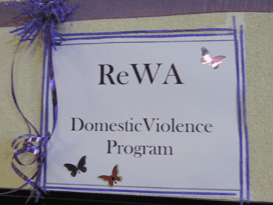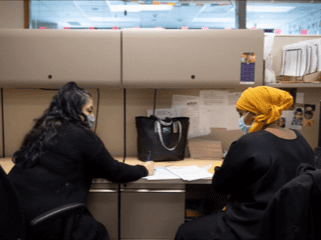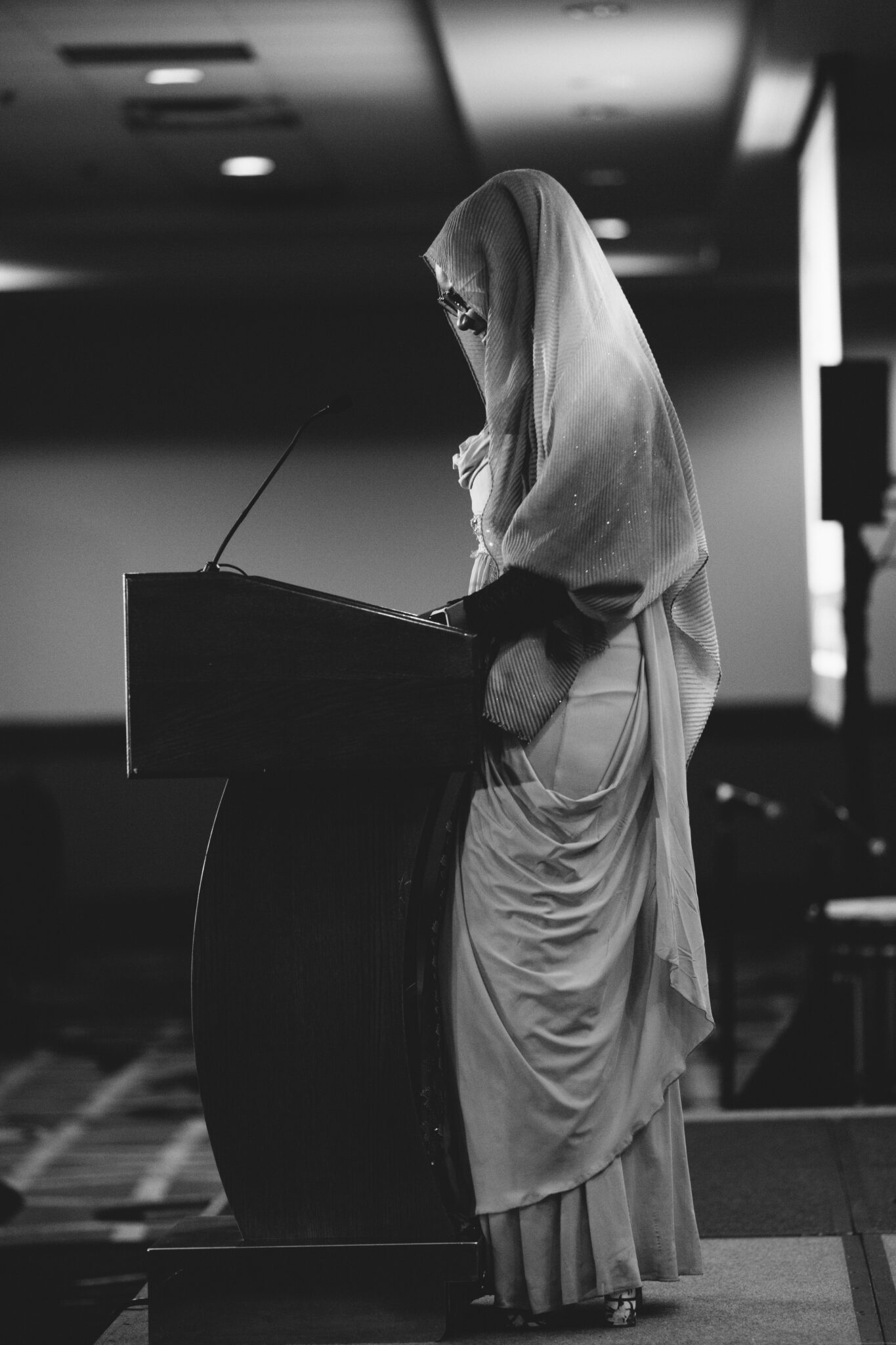
Community Corner highlights the work of Seattle Human Services’ community partners in their own words. Our goal is to gather stories and photos that illustrate their amazing work on behalf of the people of Seattle.
What is the role your organization fulfills in your community?
At Refugee Women’s Alliance (ReWA), we play a vital role in supporting refugees and immigrants from all corners of the continent by delivering essential services to those who arrive in need. Our mission is to empower them to successfully integrate into American life, offering a comprehensive range of wraparound services. What makes us unique is our commitment to hiring staff from the very communities we serve. They speak our clients’ languages and understand their culture, building a unique and trusting connection.
Our Domestic Violence (DV) program, established 37 years ago, remains a cornerstone. With a 14-member, award-winning DV team speaking 24 languages—the most extensive in the Pacific Northwest—we serve over 750 clients annually. Our services include protection orders, safety planning, shelter access, legal guidance, family law support, DV support groups, community education, training for service providers and law enforcement, and referrals to community resources. ReWA proudly stands as the sole program in the state providing culturally and linguistically appropriate services to DV victims.
How does your partnership with Seattle Human Services (HSD) assist you in that role?
Our achievements are made possible through our invaluable financial support and partnership with HSD. The trust and backing of our partners are of utmost importance, enabling our advocates to effectively address the unique needs of our communities. HSD recognizes the essential nature of our work and its significance to the well-being of our community and society.
What is your organization’s origin story?
In 1985, a group of refugee women recognized the unmet needs of refugee and immigrant women and mothers in the existing social service landscape. To address this gap, they founded the Southeast Asian Women’s Alliance (SEAWA), offering services in native languages, a unique offering at the time. SEAWA eventually evolved into ReWA.
In our early days, ReWA encountered a client bearing physical injuries inflicted by an abusive partner, with daily violence taking a toll. ReWA immediately acted by contacting the police and reaching out to various DV shelters, recognizing the imminent danger faced by the client and her children. The following day, ReWA provided assistance in obtaining a Protection Order. This pivotal incident showed the pressing need for DV services, especially within refugee and immigrant communities. We promptly applied for a city grant to offer cultural and linguistic services to DV survivors.
How has your organization grown or developed in recent years?
The population of refugees and immigrants in King County has seen a steady rise. In response, ReWA has taken proactive steps to expand our services, catering to the needs of newcomers from diverse corners of the globe. Especially noteworthy is the significant growth in demand for DV services during and after the COVID-19 years. This surge reflects an increasing need for culturally and linguistically sensitive support for domestic violence victims. Additionally, we’ve bolstered our team of behavioral health counselors to better assist clients dealing with the profound impacts of trauma.
Why is it important for HSD and City of Seattle taxpayers to invest in community-led work?
Investing in community-led work is crucial, as it ensures that organizations like ReWA and other Community-Based Organizations (CBOs) can provide impactful, cost-effective services that address critical community needs. By doing so, we can continue to offer culturally sensitive and linguistically tailored support to our diverse communities. This investment not only promotes inclusivity and addresses disparities but also leads to healthier, more resilient communities. It’s an investment in the well-being and future success of our region.
How do your programs and services help to reduce the disparities experienced by people of color living in our region?
Our programs are vital in addressing disparities faced by people of color in our region. Immigrants and refugees, often part of these communities, encounter unique challenges in the U.S., including poverty, language barriers, cultural unfamiliarity, and discrimination. Sadly, some domestic violence cases within these communities go unreported due to a lack of awareness, stemming from cultural tolerance for such violence. Adaptation stress and poverty can worsen their suffering.
In response, we take a comprehensive approach, standing as the only domestic violence program in our region with advocates fluent in numerous languages, including Arabic, Burmese, French, Lao, Mandarin, Thai, Vietnamese, Somali, Amharic, Tigrigna, Russian, Romanian, Ukrainian, Pashtu, Dari, Urdu, Farsi, Swahili, Kikuyu, German, and Spanish. This linguistic diversity helps bridge communication gaps and build trust, making our services accessible and culturally relevant.
As our region’s racial and ethnic diversity continues to grow—with BIPOC communities becoming a significant portion of the population—the need for culturally and linguistically competent services becomes even more evident. By aligning our support with the unique needs and backgrounds of people of color, we actively contribute to reducing disparities and ensuring equitable access to essential resources.
What’s one example of how an HSD-funded program or service made a difference for one of your community members?
An inspiring example from our HSD-funded programs involves Dana. In 2020, amidst the challenges of the COVID-19 pandemic, Dana turned to ReWA for help. She faced domestic violence, homelessness, unemployment, and the daunting task of adapting to life in the U.S.
With ReWA’s unwavering support, Dana’s life transformed. Together, we secured a Domestic Violence Protection Order (DVPO), liberating her from the cycle of abuse. Recognizing the value of education, our DV Advocate encouraged Dana to enroll in ESL classes and helped her find part-time work to support her family.
Dana’s journey continued as she transitioned to full-time employment, providing stability and security. Her determination led to earning an associate degree, and her children now thrive in school. Dana’s newfound confidence and happiness inspire others facing adversity, highlighting the resilience and transformative power of ReWA’s programs and services.
What motivates your staff or keeps you going?
Our unwavering mission drives our staff’s dedication. We are inspired by the critical and often unavailable services we provide—ones that are both culturally sensitive and linguistically tailored to our diverse community’s needs. One aspect of our work that’s especially valuable to those we serve, and a source of pride for our staff, is our ability to address significant issues in a culturally welcoming manner.
Recent years have seen a dramatic increase in Afghan and Ukrainian newcomers, leading to higher demand for services, including domestic violence support. King County’s housing costs and low entry-level job wages add additional pressures to our participants. Despite resource limitations, our staff’s unique benefit lies in their ability to communicate with participants in their native languages and share their cultural background. Many of our team members reside in the same neighborhoods as our clients and have experienced similar journeys to the U.S. This approach sets ReWA apart and is made possible by our dedicated and caring staff members.
The rising instances of domestic violence and the growing demand for culturally competent support highlight the necessity of our work. We are deeply committed to understanding and addressing the unique backgrounds and needs of refugees and immigrants. Our focus is on placing their needs at the forefront of our efforts, creating a tangible impact in the lives of those we serve, ensuring that every individual in our communities has the chance to thrive here regardless of their backgrounds.


